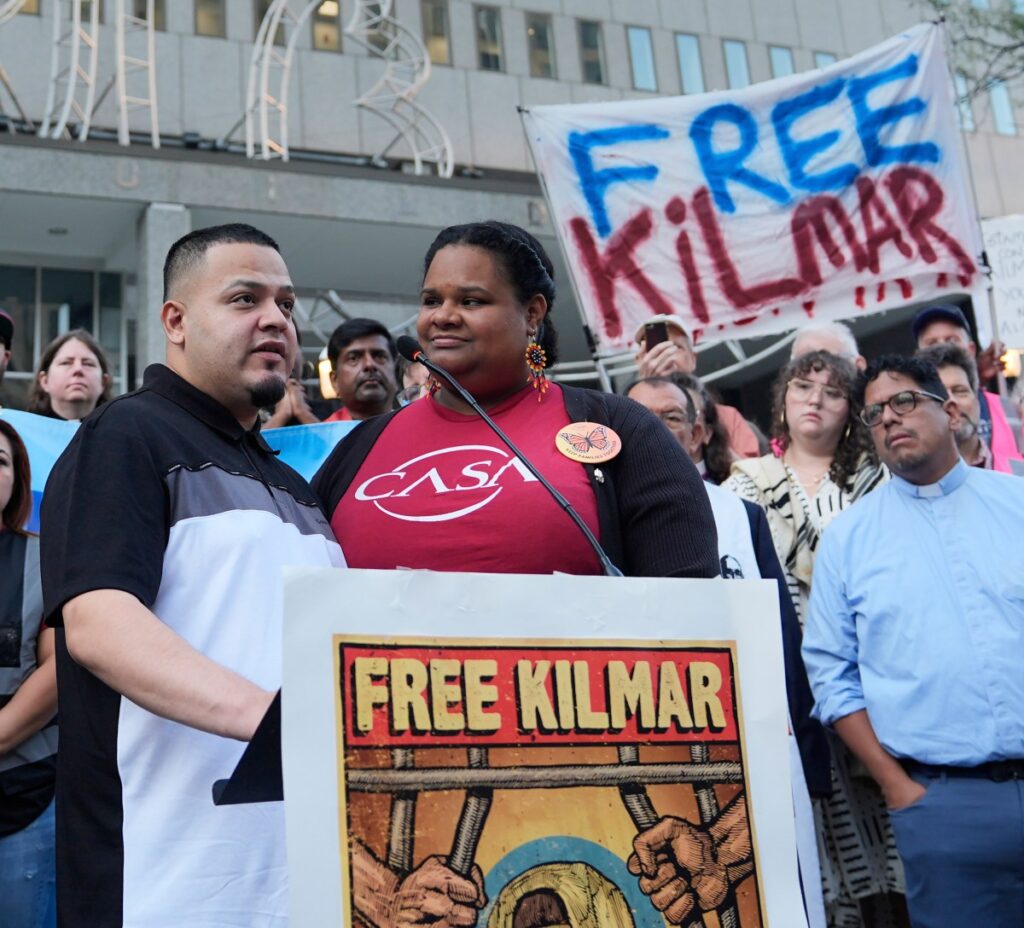The Trump administration faced a string of four significant legal defeats this week as federal and state courts pushed back on a range of initiatives spanning immigration enforcement, deportation authority, voting policy, and the use of the National Guard.
The rulings, delivered in quick succession, highlight the extent to which judges across multiple jurisdictions are scrutinizing the administration’s procedural compliance, statutory interpretations, and asserted executive powers.
Below is a detailed roundup of each development.
1. Trump Admin’s Highest-Profile Deportation Case Could Unravel
The administration’s most visible deportation effort—its attempt to remove Salvadoran national Kilmar Abrego Garcia—was undermined this week by a fundamental procedural lapse: the absence of a formal removal order in his underlying 2019 immigration case.
In the decision issued by Immigration Judge David Jones, Abrego was granted withholding of removal after the judge found credible evidence that Barrio 18 gang members had threatened him and his family over business in San Salvador.
The decision recounts the cycle of extortion, threats, and intimidation directed at Abrego and his siblings, and it reflects the court’s conclusion that he faced a serious threat of persecution if returned to El Salvador.
But crucially, while the ruling barred his removal to El Salvador, it did not memorialize a formal removal order to any country—an oversight that now sits at the center of the litigation.
At a November 20 hearing in the District of Maryland, U.S. District Judge Paula Xinis repeatedly pressed government attorneys on the missing document.
“There is no order of removal in the docket, in the record… You can’t fake it ’til you make it,” she said, underscoring that a valid removal order is the legal foundation for detention and deportation proceedings.
Abrego’s attorney, Andrew Rossman, argued that the government’s posture collapses without a formal order: “It would be an obvious due process violation to remove someone without a final order of removal,” he told the court.
The administration has sought to deport Abrego to a succession of third countries—including Uganda, Eswatini, Ghana, and now Liberia—after he offered to be removed voluntarily to Costa Rica. But Immigration and Customs Enforcement (ICE) officials struggled under questioning to explain why Costa Rica was abandoned or why the third-country selections shifted multiple times.
The missing order leaves the government’s ability to deport Abrego in doubt and adds new scrutiny to its handling of a case already intertwined with parallel criminal proceedings in Tennessee, where prosecutors are pursuing human-smuggling charges and have signaled plans to introduce a wide range of other-acts evidence against him.
For the administration, the Maryland hearings represent a significant setback: a six-year-old procedural omission now threatens to unravel one of its most publicized enforcement efforts.
2. Trump Admin Ordered to Resume Deferred Action Program for Illegal Migrants
In New York, the administration suffered a major defeat when U.S. District Judge Eric Komitee ordered Citizenship and Immigration Services (USCIS) to resume.processing deferred-action protections for Special Immigrant Juvenile Status (SIJS) recipients, i.e. in effect granting deportation protection to certain vulnerable young immigrants.
USCIS had rescinded the SIJS deferred action program in June 2025, eliminating automatic consideration for work authorization and prohibiting renewals.
Judge Komitee granted a stay of the rescission and partial injunctive relief.
The ruling requires USCIS to resume deferred-action determinations and, for certain individuals, employment-authorization processing.
With more than 150,000 SIJS recipients waiting in a visa backlog, the decision has immediate implications for young immigrants nationwide and represents one of the most substantive constraints placed on the administration’s immigration policy in months.
Without deferred action, these youths can lose access to work permits and risk deportation.
3. Judge Blocks Trump From Ending Temporary Deportation Protections
Another ruling came from the Southern District of New York, where a federal judge halted the administration’s move to terminate Temporary Protected Status (TPS) for more than 6,100 Syrians.
The plaintiffs—seven Syrian nationals, together with advocacy organizations—argued that the administration’s decision was arbitrary, inadequately justified, and motivated by impermissible considerations.
The court agreed, finding that the plaintiffs were likely to prevail and that terminating TPS at this stage would subject beneficiaries to significant risk.
The ruling prevents the policy from taking effect while litigation continues, maintaining protections and work authorization for Syrians who have been in the United States for years.
The administration may appeal, but the decision adds to a series of judicial interventions limiting its efforts to restrict humanitarian relief programs.
4. Nashville Judge Blocks Memphis National Guard Deployment
Rounding out the week’s setbacks, a Tennessee state judge issued an injunction blocking the deployment of the Tennessee National Guard to Memphis.
The troops had been activated under a presidential memorandum creating the “Memphis Safe Task Force,” designed to bolster federal and local law-enforcement operations.
Davidson County Chancellor Patricia Head Moskal ruled that the deployment likely violated state constitutional requirements governing the activation. The plaintiffs—local officials and state lawmakers—argued that the governor lacked authority to approve the deployment without legislative authorization and that crime conditions in Memphis did not meet the statutory threshold of a “grave emergency.”
The injunction bars Governor Bill Lee and Major General Warner Ross II from continuing the activation.
The ruling echoes broader legal concerns already raised in federal courts, where judges examining similar deployments in Oregon and Illinois have questioned whether the administration exceeded statutory limits under 10 U.S.C. § 12406.
Read the full article here

